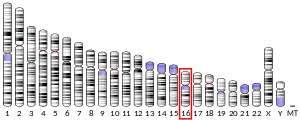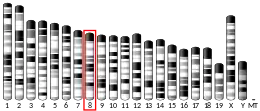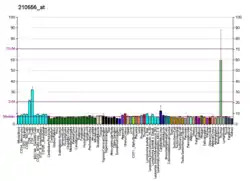NFATC3
Nuclear factor of activated T-cells, cytoplasmic 3 is a protein that in humans is encoded by the NFATC3 gene.[5][6]
Function
The product of this gene is a member of the nuclear factors of activated T cells DNA-binding transcription complex. This complex consists of at least two components: a preexisting cytosolic component that translocates to the nucleus upon T cell receptor (TCR) stimulation and an inducible nuclear component. Other members of this family participate to form this complex also. The product of this gene plays a role in the regulation of gene expression in T cells and immature thymocytes. Four transcript variants encoding distinct isoforms have been identified for this gene.[6]
See also
References
- GRCh38: Ensembl release 89: ENSG00000072736 - Ensembl, May 2017
- GRCm38: Ensembl release 89: ENSMUSG00000031902 - Ensembl, May 2017
- "Human PubMed Reference:". National Center for Biotechnology Information, U.S. National Library of Medicine.
- "Mouse PubMed Reference:". National Center for Biotechnology Information, U.S. National Library of Medicine.
- Hoey T, Sun YL, Williamson K, Xu X (May 1995). "Isolation of two new members of the NF-AT gene family and functional characterization of the NF-AT proteins". Immunity. 2 (5): 461–72. doi:10.1016/1074-7613(95)90027-6. PMID 7749981.
- "Entrez Gene: NFATC3 nuclear factor of activated T-cells, cytoplasmic, calcineurin-dependent 3".
Further reading
- Rao A, Luo C, Hogan PG (1997). "Transcription factors of the NFAT family: regulation and function". Annual Review of Immunology. 15: 707–47. doi:10.1146/annurev.immunol.15.1.707. PMID 9143705.
- Crabtree GR (Mar 1999). "Generic signals and specific outcomes: signaling through Ca2+, calcineurin, and NF-AT". Cell. 96 (5): 611–4. doi:10.1016/S0092-8674(00)80571-1. PMID 10089876. S2CID 8817053.
- Horsley V, Pavlath GK (Mar 2002). "NFAT: ubiquitous regulator of cell differentiation and adaptation". The Journal of Cell Biology. 156 (5): 771–4. doi:10.1083/jcb.200111073. PMC 2173310. PMID 11877454.
- Masuda ES, Naito Y, Tokumitsu H, Campbell D, Saito F, Hannum C, Arai K, Arai N (May 1995). "NFATx, a novel member of the nuclear factor of activated T cells family that is expressed predominantly in the thymus". Molecular and Cellular Biology. 15 (5): 2697–706. doi:10.1128/mcb.15.5.2697. PMC 230500. PMID 7739550.
- Jabado N, Le Deist F, Fisher A, Hivroz C (Nov 1994). "Interaction of HIV gp120 and anti-CD4 antibodies with the CD4 molecule on human CD4+ T cells inhibits the binding activity of NF-AT, NF-kappa B and AP-1, three nuclear factors regulating interleukin-2 gene enhancer activity". European Journal of Immunology. 24 (11): 2646–52. doi:10.1002/eji.1830241112. PMID 7957556. S2CID 30435577.
- Vacca A, Farina M, Maroder M, Alesse E, Screpanti I, Frati L, Gulino A (Nov 1994). "Human immunodeficiency virus type-1 tat enhances interleukin-2 promoter activity through synergism with phorbol ester and calcium-mediated activation of the NF-AT cis-regulatory motif". Biochemical and Biophysical Research Communications. 205 (1): 467–74. doi:10.1006/bbrc.1994.2689. PMID 7999066.
- Di Somma MM, Majolini MB, Burastero SE, Telford JL, Baldari CT (Sep 1996). "Cyclosporin A sensitivity of the HIV-1 long terminal repeat identifies distinct p56lck-dependent pathways activated by CD4 triggering". European Journal of Immunology. 26 (9): 2181–8. doi:10.1002/eji.1830260933. PMID 8814265. S2CID 23430217.
- Masuda ES, Liu J, Imamura R, Imai SI, Arai KI, Arai N (Apr 1997). "Control of NFATx1 nuclear translocation by a calcineurin-regulated inhibitory domain". Molecular and Cellular Biology. 17 (4): 2066–75. doi:10.1128/mcb.17.4.2066. PMC 232054. PMID 9121455.
- Chow CW, Rincón M, Cavanagh J, Dickens M, Davis RJ (Nov 1997). "Nuclear accumulation of NFAT4 opposed by the JNK signal transduction pathway". Science. 278 (5343): 1638–41. Bibcode:1997Sci...278.1638C. doi:10.1126/science.278.5343.1638. PMID 9374467.
- Amasaki Y, Masuda ES, Imamura R, Arai K, Arai N (Mar 1998). "Distinct NFAT family proteins are involved in the nuclear NFAT-DNA binding complexes from human thymocyte subsets". Journal of Immunology. 160 (5): 2324–33. doi:10.4049/jimmunol.160.5.2324. PMID 9498773. S2CID 19932048.
- Zhu J, Shibasaki F, Price R, Guillemot JC, Yano T, Dötsch V, Wagner G, Ferrara P, McKeon F (May 1998). "Intramolecular masking of nuclear import signal on NF-AT4 by casein kinase I and MEKK1". Cell. 93 (5): 851–61. doi:10.1016/S0092-8674(00)81445-2. PMID 9630228. S2CID 9515426.
- Aramburu J, Garcia-Cózar F, Raghavan A, Okamura H, Rao A, Hogan PG (Apr 1998). "Selective inhibition of NFAT activation by a peptide spanning the calcineurin targeting site of NFAT". Molecular Cell. 1 (5): 627–37. doi:10.1016/S1097-2765(00)80063-5. PMID 9660947.
- Imamura R, Masuda ES, Naito Y, Imai S, Fujino T, Takano T, Arai K, Arai N (Oct 1998). "Carboxyl-terminal 15-amino acid sequence of NFATx1 is possibly created by tissue-specific splicing and is essential for transactivation activity in T cells". Journal of Immunology. 161 (7): 3455–63. doi:10.4049/jimmunol.161.7.3455. PMID 9759864. S2CID 24271152.
- Loftus BJ, Kim UJ, Sneddon VP, Kalush F, Brandon R, Fuhrmann J, Mason T, Crosby ML, Barnstead M, Cronin L, Deslattes Mays A, Cao Y, Xu RX, Kang HL, Mitchell S, Eichler EE, Harris PC, Venter JC, Adams MD (Sep 1999). "Genome duplications and other features in 12 Mb of DNA sequence from human chromosome 16p and 16q". Genomics. 60 (3): 295–308. doi:10.1006/geno.1999.5927. PMID 10493829.
- Amasaki Y, Adachi S, Ishida Y, Iwata M, Arai N, Arai K, Miyatake S (Jul 2002). "A constitutively nuclear form of NFATx shows efficient transactivation activity and induces differentiation of CD4(+)CD8(+) T cells" (PDF). The Journal of Biological Chemistry. 277 (28): 25640–8. doi:10.1074/jbc.M201860200. PMID 11997392. S2CID 27918489.
- Chagnon P, Michaud J, Mitchell G, Mercier J, Marion JF, Drouin E, Rasquin-Weber A, Hudson TJ, Richter A (Dec 2002). "A missense mutation (R565W) in cirhin (FLJ14728) in North American Indian childhood cirrhosis". American Journal of Human Genetics. 71 (6): 1443–9. doi:10.1086/344580. PMC 378590. PMID 12417987.
External links
- NFATC3+protein,+human at the U.S. National Library of Medicine Medical Subject Headings (MeSH)
This article incorporates text from the United States National Library of Medicine, which is in the public domain.






